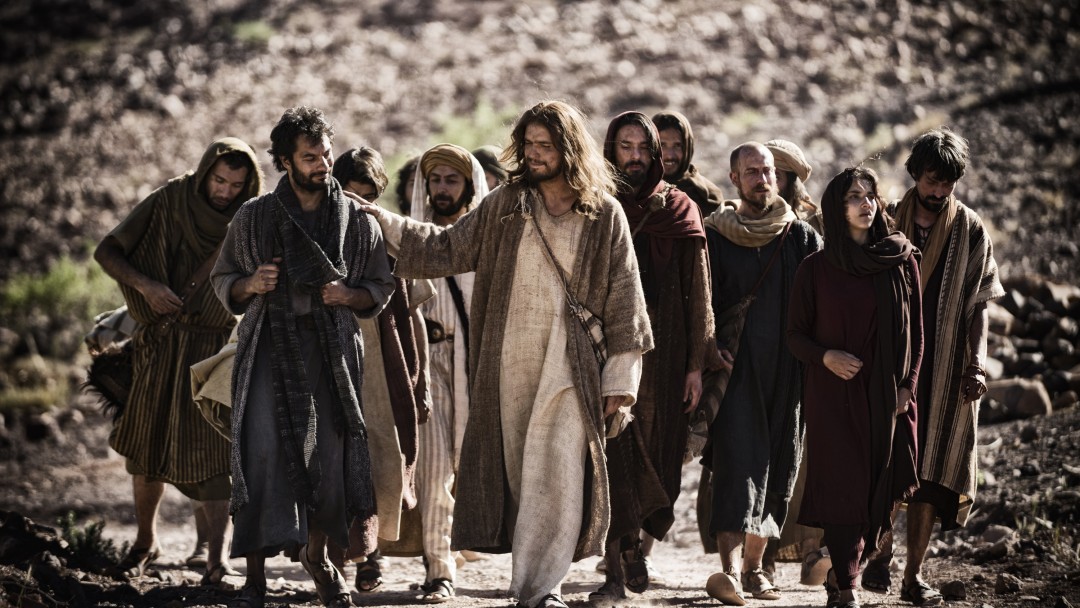The next scene, after Jesus begins his ministry in Galilee proclaiming his message, has him choosing some disciples. The first thing this indicates is that the Jesus of Mark considers himself a Rabbi, a teacher who had authority (Hebrew s'mikhahto) to interpret Scripture and had his own interpretation, or "yoke", that he would instruct students, or disciples, in.
Most Rabbis, or "masters", were Torah teachers, "teachers of the law", as referred to in the Gospels, who could only teach accepted interpretations, mainly the interpretation, or "yoke", that their master had instructed, or passed on to them as their disciples. Those with s'mikhahto could make new interpretations, pass legal judgements, and could call their own talmidim (disciples) to learn and pass on their yoke. (https://www.thattheworldmayknow.com/rabbi-and-talmidim)
In Matthew 21:23-27, Jesus is questioned on his authority to interpret the law; from which authority did he get his interpretation from, who was his teacher, or what qualified him as having his own authority? The Gospels give him no credentials, no claims to have studied at any specific Beth Midrash, or to have been a talmidim and travelled with some famous Rabbi. In fact, as we saw earlier, the writer of Mark makes some effort to discourage the idea he might have been a student or follower of John the Baptist.
This begs the question of why the brothers would drop their nets and follow him when he called. This would have been a big commitment on their part and for someone who had no credentials.
Doug Greenwold, a Teaching Fellow at Preserving Bible Times, describes what was expected in becoming a Rabbi's disciple:
If a rabbi ultimately agreed to a would-be-disciple’s request, and allowed him to become a disciple, the disciple-to-be agreed to totally submit to the rabbi’s authority in all areas of interpreting the Scriptures for his life. This was a cultural given for all observant Jewish young men – something each truly wanted to do. As a result, each disciple came to a rabbinic relationship with a desire and a willingness to do just that - surrender to the authority of God’s Word as interpreted by his Rabbi’s view of Scripture. https://bible.org/article/being-first-century-disciple
Ray Vander Laan, a teacher of Jewish culture who received his Master's of Divinity from Westminster Theological Seminary , explains it further:
The decision to follow a rabbi as a talmid meant total commitment in the first century as it does today. Since a talmid was totally devoted to becoming like the rabbi he would have spent his entire time listening and observing the teacher to know how to understand the Scripture and how to put it into practice. Jesus describes his relationship to his disciples in exactly this way (Matt. 10:24-25; Luke 6:40) He chose them to be with him (Mark 3:13-19) so they could be like him (John 13:15). https://www.thattheworldmayknow.com/rabbi-and-talmidim

What also are we to make of Jesus' choice of talmidim? He calls two fishermen of Galilee. Now, at the beginning of this study I stated that I wish to identify my own bias while interpreting this Gospel. My bias would be to spin a narrative that sees the community of Mark portraying Jesus as deliberately choosing marginalized and uneducated as people and affirming them as eligible to follow his teaching and way of life. This certainly would be in keeping with the theme throughout the Gospel of Jesus including and even preferring the marginalized. However, Ray Vander Laan suggests that these assumptions about these fishermen may not hold true and that:
The people of Galilee were the most religious Jews in the world in the time of Jesus. This is quite contrary to the common view that the Galileans were simple, uneducated peasants from an isolated area.Be that as it may, what is important to this study is what view the people of the community of Mark held and how it informed their telling of their story of Jesus. I have to conclude that they would share the prejudices of the Jews of the other provinces that we looked at in the previous post and saw Galilee as representing an unsophisticated and rural poor.
The Galilean people were actually more educated in the Bible and its application than most Jews. More famous Jewish teachers come from Galilee than anywhere else in the world. They were known for their great reverence for Scripture and the passionate desire to be faithful to it. This translated into vibrant religious communities, devoted to strong families, their country, whose synagogues echoed the debate and discussions about keeping the Torah
Most commonly a person would ask a Rabbi to take them on as a disciple rather than a Rabbi asking someone to follow them. An article by Doug Trudell (whose credentials I can not find) suggests the type of criteria a Rabbi would use for a talmidin:
To make his decision, a rabbi would question you. He would seek to determine your scriptural knowledge. He would question you regarding the sages and the prophets and dig into your interpretation of the Scriptures and various laws. Ultimately the rabbi would be seeking to answer just one question. That is....Can this potential disciple, really become just like me, or putting it another way, can this potential talmid become a mirror image of me?Breaking that down, the rabbi was trying to determine if you could a) learn all of his teachings b) learn to think and act as he acted and c) could you then spread his “yoke” to others. http://dougtrudell.com/html/i_choose_you.html
I can also see the Gospel writer's lack of credentials for Jesus as a defiance of the monopoly "accredited" Rabbis had on interpreting Scripture in the Jewish world. Jesus did not need credentials or a specialized education to claim authority and convince others to follow him and become his disciples. Neither did the community of Mark believe that they did.
I believe that the community of Mark held a view on authority for teaching similar to that latter expressed in the Gospel of John.
16 Jesus answered, “My teaching is not my own. It comes from the one who sent me. 17 Anyone who chooses to do the will of God will find out whether my teaching comes from God or whether I speak on my own." (John 7:16-17)Jesus' lack of credentials also reinforced the narrative that his teaching was, "not of man, but of God". Simon and Andrew's decision to become Jesus' talmidim when he had no credentials or recognized status would also speak to the idea that, as suggested in the passage above, that people who did thw will of God could recognize that his teaching came from God rather than his speaking on his own.


No comments:
Post a Comment